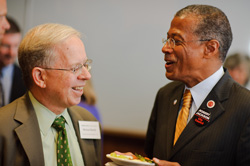Campaigning for Educational Equity - Beyond the Schoolhouse
TC's Michael Rebell has established a new task force in New York State to urge comprehensive support for disadvantaged kids
The Campaign for Educational Equity at Teachers College launched in January a task force that will consider ways to implement a child’s right to a sound, basic education comprehensively and guarantee children living in poverty in New York
“New York and, in the long run, the United States needs to recognize that children have a basic right to a meaningful educational opportunity that includes such educational essentials as health services and preschool and after-school programs,” said Michael A. Rebell, Executive Director of The Campaign for Educational Equity. “We see today how these educational necessities are in jeopardy because of the poor economy. Even though we are currently experiencing an economic downturn, we need to keep working to assert and enforce children’s educational rights and the range of services they need to take advantage of those rights.”
Providing students and their families with such support services has emerged in recent years as a key issue for reformers, who have seized on it as the next phase in the struggle to provide disadvantaged children an adequate education and narrow the achievement gap between white and minority students.
The task force, which is still being formed, includes the After School Corporation, Alliance for Quality Education, Campaign for Fiscal Equity, Chemung County (New York) School Readiness Project, Children’s Aid Society, Child Care Inc., Harlem Children’s Zone, New York City Department of Education, New York State Council of School Superintendents, New York State School Boards Association, Say Yes to Education, Schuyler Center for Analysis and Advocacy, TurnAround (formerly Turnaround for Children), and the United Federation of Teachers.
The formation of the task force comes amid a gloomy economic landscape in New York New York City
To Rebell, the Campaign for Fiscal Equity litigation that he led established the right of all children to a “sound, basic education.” Providing additional support services to disadvantaged students is an extension of that right, he said, for without such resources these children would be hard-pressed to take as full an advantage of any educational opportunities as their middle-class counterparts.
“We’re not suddenly becoming preschool advocates; we’re not suddenly becoming after-school advocates,” Campaign Policy Director Jessica Wolff said. “We are longtime advocates for educational equity, and we understand that these services and resources—and others—are integral components of educational equity, and they have to be treated that way in policy and in law.”
The task force will begin by working with scholars at Teachers College to conduct research, as well as take part in a series of public forums organized by the Campaign for Educational Equity, in an effort to identify resources and services that would be effective in mitigating some of the most pernicious effects of poverty and promoting academic success. Those services could involve everything from nutrition and healthcare programs to initiatives that develop parents’ capacity to enhance their children’s learning.
Once that process is completed, the task force will develop cost estimates for implementing the various services statewide, and create and pilot models for providing them in high needs schools and communities.
“On the basis of all that information,” Rebell said, “we will come up with a legislative package of what we think New York needs to implement at a cost figure that is manageable and, hopefully, we can convince the legislature enact these proposals. ”
Published Tuesday, Mar. 10, 2009
